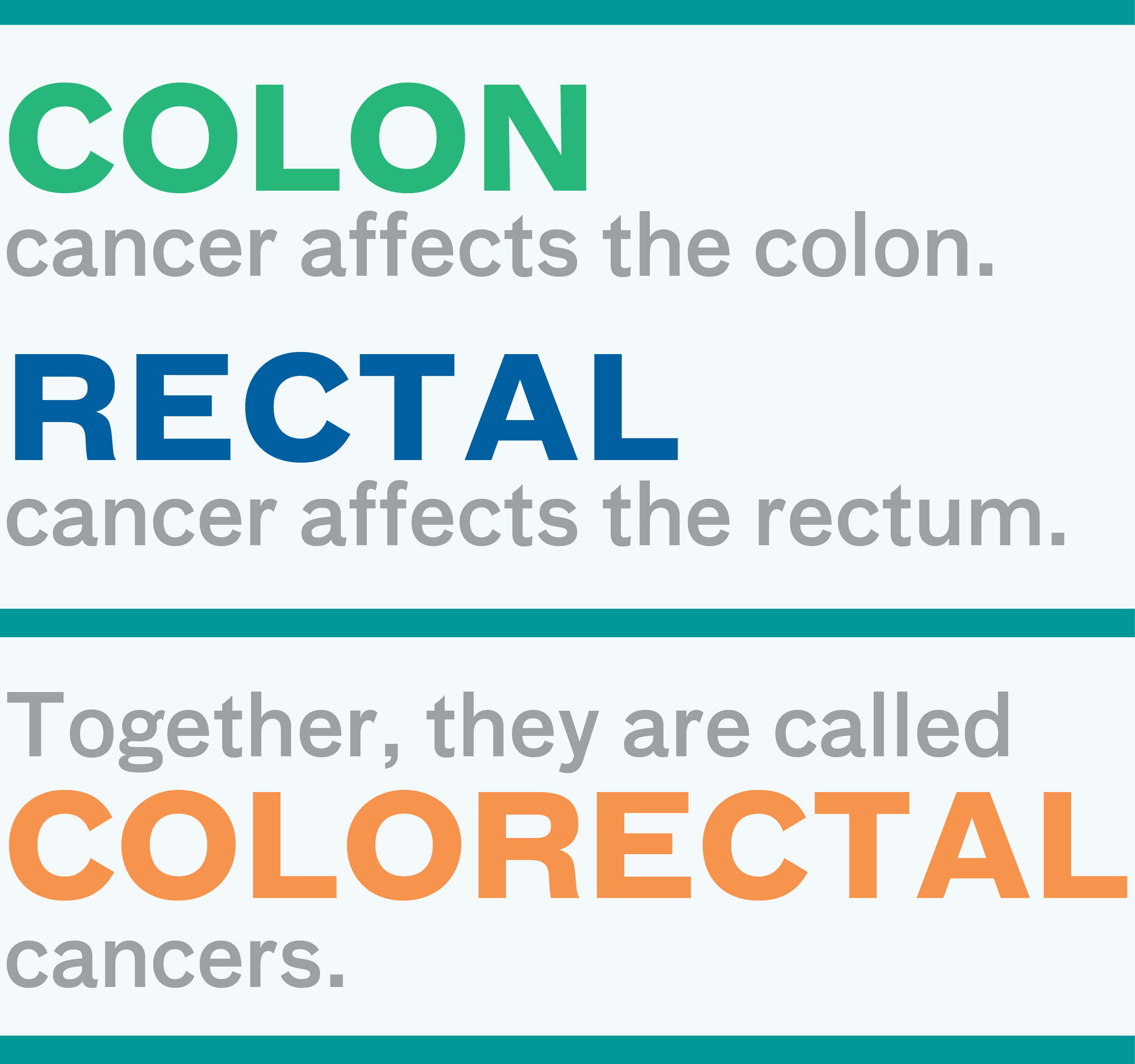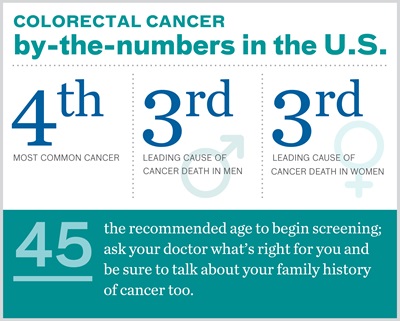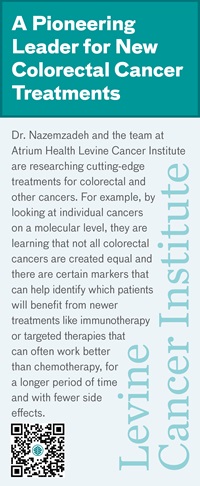Talking about your gut health may not be first on your list. After all, it involves bowel movements, the colon, and things that, well, make most of us feel slightly uncomfortable. But since March is colorectal cancer awareness month, now is a great time to discuss.
Your stool can say a lot about your overall health and diet. It can tell you if you're eating enough fiber, drinking enough water or if your body is digesting food too quickly or slowly. Anytime there is blood in your stool or when you wipe, it can also be a warning sign of colorectal cancer or other issues.
“Everybody should look at their stools. I know it's gross to talk about, but it's something that we all need to get into the habit of doing,” said Reza Nazemzadeh, MD, oncologist at Atrium Health Levine Cancer Institute. “I often hear from people, ‘I just have a bad gut.’ But that really should not be normal for anybody. There's a reason and you have to seek answers.”
In fact, being an advocate for your health and getting answers is crucial.
“It’s your responsibility to care about your body and to be your own advocate. If you are having diarrhea, constipation, or blood in your stools, for example, you need to seek and get answers,” Dr. Nazemzadeh said. “A lot is tied into the gut and our gut health has many implications on the rest of the body. It affects your mood, your cognition, how you feel day-to-day, and it also affects your cancer risk. We still have a lot to learn, but it's just as important as heart health.”
In fact, colorectal cancer remains the third most common cancer in the U.S. Recent trends show that more and more young people -- those between 20 and 49 years of age -- are being diagnosed with it. This highlights the need to take steps to catch it earlier and try to prevent it. Dr. Nazemzadeh explains that the rise in colorectal cancers among younger Americans may be partially due to diet. The increase in eating fast food, red and other processed meats like hot dogs and bacon, and not eating enough fresh fruits and vegetables, fish, whole grains and legumes are likely a big part of the problem. In addition, growing waistlines and a lack of exercise increases risks.
So, what are some ways to take better care of your colon health? Dr. Nazemzadeh gives the following advice:
1. Get a colonoscopy when it’s time or if you have symptoms that need colon screening to help determine the root cause. 
A colonoscopy is an exam to look inside the large intestine (colon) and rectum to see if there are any changes, including any inflamed or swollen areas, polyps (pre-cancerous growths) or cancer. Historically, a first screening colonoscopy was done at age 50, but because there are so many more cases in younger people, the American Cancer Society now recommends a first screening at age 45 even for people without underlying risk factors, such as a family history. “Cancer usually forms from a polyp. A polyp can bleed, cause anemia (not enough healthy red blood cells to carry oxygen to the body), or cause other symptoms. But if you have a coloscopy and find one, you can remove it and that can prevent the eventual development of cancer,” said Dr. Nazemzadeh. “There aren’t many things we can do in health care that can catch cancer early or potentially prevent cancer. It is really a necessary part of staying healthy and protecting yourself.” And we’re not asking people to get it done every year, sometimes it’s done once every 10 years. Dr. Nazemzadeh acknowledges that getting a colonoscopy is not something that most people look forward to, but we do a lot of other things that don’t have nearly the same benefit. Be sure to check with your insurance; most of the time it’s covered at no cost to you. If it’s time, schedule your colonoscopy today.
2. Know family history of polyps or cancers. Knowing what cancers your sisters, brothers, parents, aunts, uncles and grandparents have had is important and may change when and how often you need screening.
3. If you have any of these symptoms, talk with your doctor or health care team:
- Changes in or inconsistent bowel movements, constipation (feeling as though you need to go to the bathroom, but you can’t), diarrhea or leaking
- New or unexplained abdominal pain
- Cramps and gas
- Unusual looking stools - healthy stool is usually a soft, formed bowel movement that is typically brown in color
- Blood in your stool
A few other reminders:
- Don’t accept “I just have a bad gut.” Your stools should be consistent, and healthy in terms of color and form.
- If you have blood in your stool, take it seriously. “It doesn’t matter how old you are. Don’t assume it’s just hemorrhoids. Get checked by your doctor and be sure to talk about any other symptoms,” Dr. Nazemzadeh advises.
- If you’re unusually tired or weak, ask if you could be anemic due to iron deficiency. If so, you should get a colorectal screening. Colorectal cancer is often accompanied by anemia because of even subtle bleeding in the colon that you may not see in the stool.
- Don’t accept the diagnosis of irritable bowel syndrome without a colonoscopy.
4. Know what factors make colorectal cancer more likely. This way you can try to make positive changes for your colon and general health. For example:
- A diet low in fruits and vegetables and whole grains, or high in fat and red and processed meats
- Lack of regular physical activity
- Being overweight or obese
- Alcohol use
- Smoking
- Family history of polyps or colorectal cancer
- Having had polyps before
5. It can be hard to know where to start when making healthy lifestyle changes, so ask for help. Talk with your care team. They can help connect you with resources or more information. It’s important to:
- Try to walk as much as possible – park farther away from the store or your office or take the stairs
- Don’t be overwhelmed by exercise – it can be as simple as a walk, swimming, yardwork or riding a bike ride
- Plan ahead and pack healthy snacks and fruit when you head out
- Drink more water
- Eat more fiber, which can be protective, so fresh fruits and vegetables, whole grains, nuts, beans, lentils, quinoa, among others
- Cook meals at home, and grill or bake foods instead of frying them or using butter
6. Make it a family affair to support one another. “We’re surrounded by fast food, cookies, cake and candy--it’s hard. It takes active effort to eat well and we are all busy,” said Dr. Nazemzadeh. “It’s important to get the whole family to buy in and stick with it. And we need to teach our children healthy habits when they’re young so that becomes the norm for them.”



